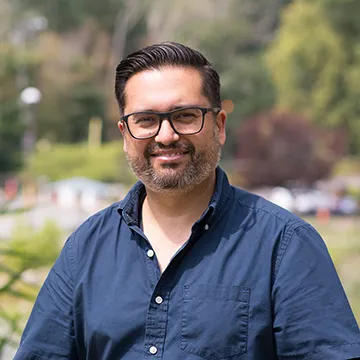Q&A: Summer Research in Forensic Psychology

Alejandro Leguizamo – an expert in the assessment and treatment of sex offenders – is working with two graduate students on research projects tackling real-world issues. We talked to him to find out more about this research and the impacts his students are making in real communities:
What are the research projects you are working on with the two students?
One involves the assessment of ethnic differences in sentencing patterns among convicted sex offenders. The other involves trying to find predictors of fatal opioid overdoses in a community sample from New Bedford, Massachusetts.
The first project, the sentencing study, is a master's thesis project for Paige Beliveau, a graduate student in our M.A. in Forensic Psychology program. It's based on data from the Massachusetts Treatment Center. Paige is looking at detailed criminal histories and whether there are ethnic differences in how these type of offenders are sentenced. She's trying to assess whether there is any bias in the courts and what factors appear to predict sentencing length.
And the second project?
This is a master's project that started with Sean Varano from the School of Justice Studies. He had data from emergency services where ambulances responded to potential overdoses. Julia Uber, another student in the M.A. Forensic Psychology program who is conducting the research, is focusing on official overdoses and is trying to predict what factors may lead to multiple overdoses and what factors lead to fatal overdoses.
How do you work with each student? Are you heavily involved in the project or just serve in a supervisor role?
It depends. I can be both involved in a hands-on way or serve as just a guide. It's about how I can best serve the students. The students I am working with currently, for example, are doing a lot of work independently and I have just been assisting as needed. For example, over the summer, they did data collection, so I helped them with designing the collection tools that they then used to enter the data from the reports that they had. At this point, they are starting to finish data entry, so now we are going to start analyzing the data together.
What are some of the potential impacts these projects can have for a community?
For the sentencing study, it is about raising awareness and sharing the findings with the communities they come from. Paige has already presented initial findings at a conference last year. This year, she will present her overall findings at a national conference for the Association of Criminal Sexual Abusers. It is a national conference, but there will be individuals from all over the world attending. The hope will then be to turn her master's thesis into a manuscript and submit it for publication.
For the overdose study, the results will be shared with the city of New Bedford. It will be useful in trying to prevent overdoses. Our hope is that it will lead to more lengthy follow-ups, so that we can save lives and fine tune this line of research. The goal is also for Julia to present this in a conference and to seek publication.
Are there any other projects you are working on with RWU students?
Yes! I have been working with Dr. Erin Tooley – an assistant professor in the department – on a project to identify predictors of psychological well-being for a diverse community. We are working with over eight undergraduate and graduate research assistants.

